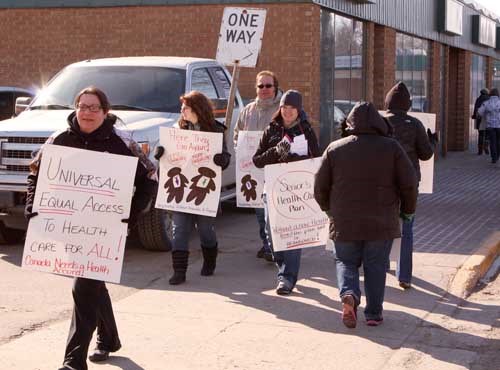Local members of the Canadian Union of Public Employees (CUPE) demonstrated March 31 in front of the First Avenue office of Yorkton-Melville MP Garry Breitkreuz to protest the federal government's refusal to negotiate a new health accord with the provinces.
"Today concerned citizens and health care providers are holding a national day of action to let Canadians know what the expiration of the health accord means to them and the harm this will cause to our health care system," said Cindy McGregor, a CUPE health care worker and one of the organizers of Monday's event.
The demonstrators claimed that the expiration of the federal-provincial agreement signed in 2004 means a cut of 1.1 billion in health care transfers over the next ten years.
"Faced with the massive cuts and without any plan of improving medicare it will also mean more and more provinces will open up services for profit, corporatizations and lead us further down the path of Americanized private health care," McGregor said.
Breitkreuz said he was frankly perplexed by the whole situation saying his government had increased health care transfers by 47 per cent and committed to six per cent per year moving forward.
"The information the union leadership and the NDP are spreading is false," he said. "I think there's political motivation to try to confuse the people."
It is, without question, somewhat confusing. That may be because in 2011, the Conservatives decided to unilaterally legislate the funding formula for the Health Care Transfer until 2024. The new law that took effect yesterday following the expiration of the 2004 negotiated accord keeps the overall increase to federal health care transfer payments at six per cent per year, projected to keep pace with provincial health care spending, until 2017-2018. After that the transfers will be tied to the growth of the economy.
In 2012, then-parliamentary budget officer Kevin Page forecasted the increases until 2023-2024 would be around 3.9 per cent. According to the Page report this will put the federal government on good fiscal footing by creating predictability, but burden the provinces, or at least most of them, with revenue increases that will not keep up with expenses.
Also part of the legislation was a change to the basis on which transfers are calculated. Formerly it was a per capita basis, but adjusted according to provincial income levels. Starting this year, that changes to an equal per capita calculation.
For Saskatchewan, that means an increase of $42 million or 4.2 per cent for this year.
In fact, there is only one province that benefits from the redistribution, and it benefits big. Alberta will receive an extra $1.03 billion in 2014-2015, an increase of 38 per cent, fully 56 per cent total national increase of $1.8 billion.
The other outlier is the Northwest Territories at 44 per cent. All other provinces and territories range between zero per cent (Newfoundland/Labrador and Nunavut) and 6.4 per cent (Yukon).
For CUPE and its national day of action it may be a matter of encouraging national discourse between the two levels of government.
"We don't know what the chances are, but if we don't put any pressure on the government to do that, they probably won't," said Patty Brockman, a CUPE staff representative and another organizer of the Yorkton protest Monday. "They haven't yet."
For Breitkreuz, it is a matter of getting the federal government under control.
"We are balancing the budget and we did not do it the way the previous Liberal government did by reducing transfers to the provinces," he said.
But critics are condemning the new formula because it does not take into account
"On the one hand, equal per capita cash payments are the simplest way to distribute money and directly address the need for visible demonstration of fair treatment," wrote Dr. Livio Di Matteo, an economist in health economics at Lakehead University for the website evidencenetwork.ca. "However, there is a difference between equity and equality and treating everyone exactly the same may not always be fair.




